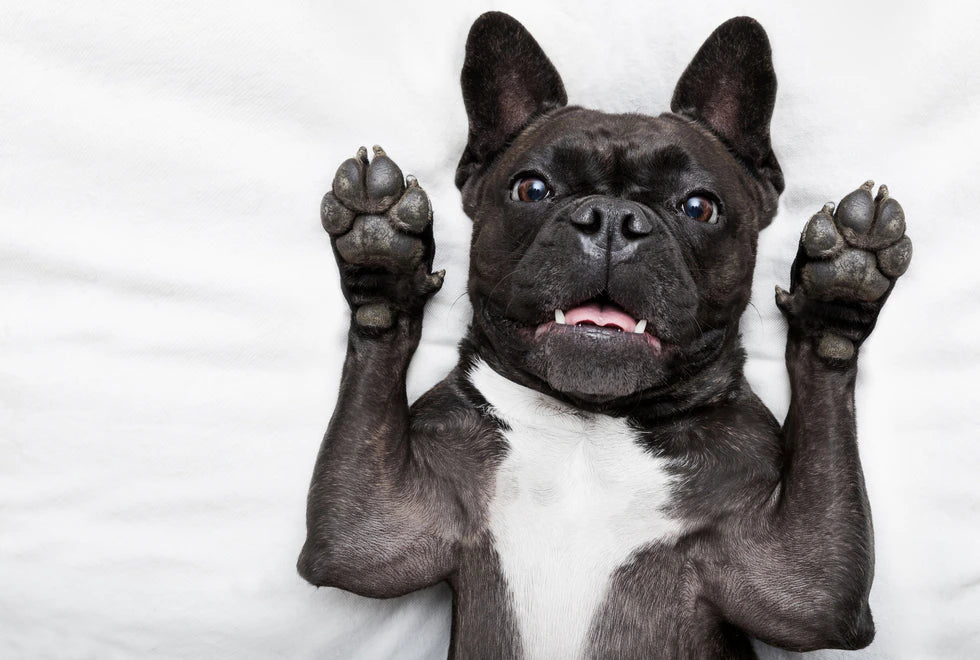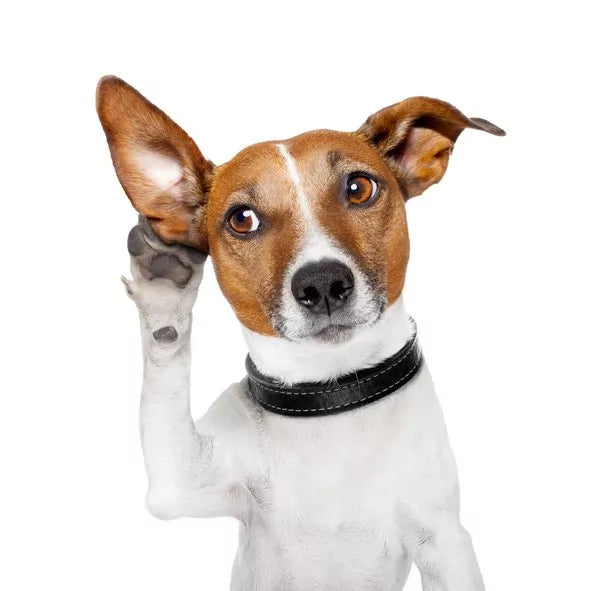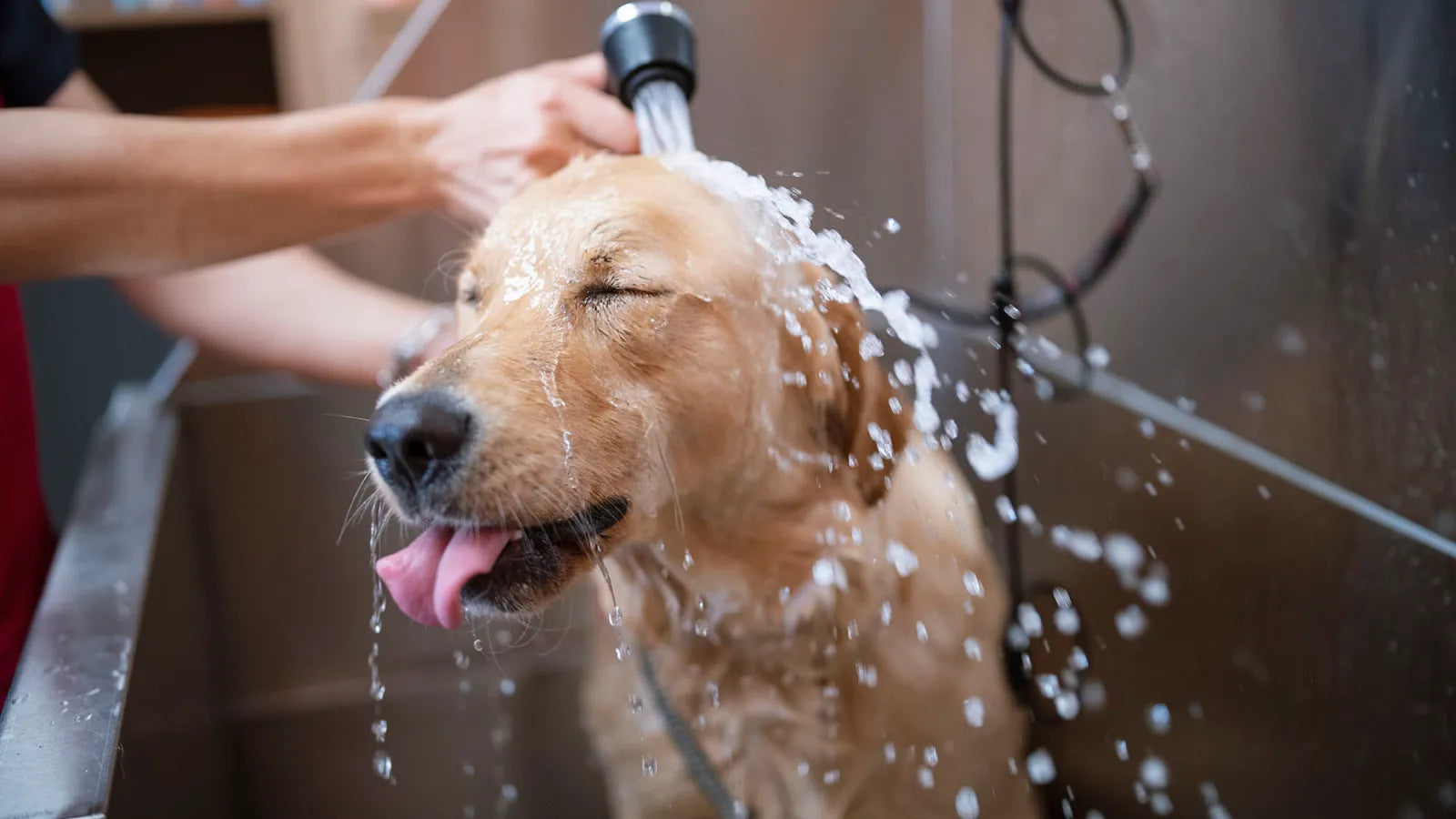Let's address the elephant in the room: why does my dog smell?!
It's a common dilemma for dog owners - you adore your furry best friend, but sometimes your pup seems a little too...fragrant (and not in a good way!). From the stinky breath when they pant up close to the musky body odour that seems impossible to wash off, dog smells can be hard to ignore.
It's understandable this causes frustration and even embarrassment for pet parents. But before getting angry at your smelly hound, it's important to understand the potential underlying causes. Odour problems in dogs can arise from various health issues, diet and environment. Getting to the root of the smell is key before trying to fix it through bathing alone.
By first taking your dog to the vet for a checkup, analyzing their diet, and looking at environmental factors, you can identify the source. Whether it's dental disease, skin infections, gas from poor-quality food or even excessive moisture in their surroundings, the offender needs to be pinpointed. Have some patience with your pup during this process. With a little diligence and medical guidance, you'll solve the stinky mystery soon!

Figuring out why your dog has an offensive odour is needed for their health and happiness. So let's walk through the steps to get to the bottom of the problem in a positive way. With some adjustments after identifying the smell trigger, you and your dog will both breathe easier in a fresher, healthier home.
Common Causes of Dog Smell
Skin Issues
Several common skin diseases lead to unusual and strong odours in dogs. Bacterial or yeast infections on the skin cause itchiness, redness and a rancid or musty smell. Dogs with dermatitis, characterized by inflamed skin and hair loss, also give off a foul, pungent scent. Allergies, seborrhea and other disorders disrupt skin health too. As bacteria and yeast thrive, so does the stench. Getting to the root cause with a vet helps treat the smell.
Dental Problems
Dental issues are another source of sheer stink. Just as in humans, when plaque and tartar build-up, they interact with bacteria and fuel gum disease. From this infection, the foul breath of periodontal disease emerges. It's amplified by other problems like broken teeth or oral tumours. Daily brushing, yearly cleanings at the vet, and dental treats maintain healthy teeth and gums. This reduces bad breath significantly.
Ear Infections
Infected ears are a common source of bad smells in dogs. Bacteria and yeast overgrowth within the ear canal produces a rancid, pungent odour. Excessive head shaking and ear scratching are signs of an infection. Keeping ears clean and dry prevents these infections. Gently wipe outer ears weekly with a vet-approved cleanser. After baths or swimming, dry your dog's ears thoroughly. Consult your vet promptly if you detect a foul smell from their ears.

Anal Gland Issues
Problems with the anal glands can likewise cause extremely stinky symptoms in dogs. These glands produce a territorial marking scent normally released through stool passage. But when impacted, infections occur that cause a fishy, skunk-like smell. Scooting, licking under the tail and other signs point to anal gland issues. Vets can express blocked glands and provide medication if needed. Ensure your dog has a fiber-rich diet and exercises regularly to void the glands naturally.
As you can see, several common health issues explain why dogs can be so smelly! By staying alert to symptoms like skin and mouth odour, scratching and scooting, you can get veterinary help early. Addressing these conditions improves your dog's comfort, health and of course, their scent. With diligent care, your doggo will smell as sweet as they look.
Managing and Preventing Dog Smell
Regular Grooming Practices
Regular bathing with a gentle dog shampoo prevents odours from accumulating. Short-haired dogs can be bathed weekly while long-haired breeds do best with baths every 2-3 weeks. Choose shampoos formulated specifically for your dog's coat type. Brush dogs daily to distribute natural skin oils and remove dirt and dead hair. Matted, unbrushed coats harbour odours. Trim overgrown hair that traps moisture and oil as well.

Proper Dental Care
Vigilant dental care is very important. Brush your dog's teeth 2-3 times a week with special toothpaste and a soft brush. Annual cleanings and exams by your vet remove plaque buildup. Hard treats and chew toys help scrape away tartar. Signs like bad breath, yellow teeth or inflamed gums mean it’s time for a veterinary dental cleaning. Maintaining good oral hygiene blocks bad smells at the source.
Ear Care
Regular ear cleaning prevents infection-related odours. Gently wipe the outer ear weekly with a cotton ball soaked in vet-approved solution - never use cotton swabs inside. Check for debris, redness or bad smells. After baths, thoroughly dry your dog's ears. Inspect ears weekly for any changes. If you notice sensitivity, discharge or a foul smell, promptly contact your vet. Practicing prevention keeps ears healthy.
Anal Gland Maintenance
Anal glands should be expressed only if needed. Signs like scooting, biting or licking near the tail may signal impacted glands. Only attempt to express them if your vet advises it after an exam. Apply gentle pressure on both sides to empty the contents. Never squeeze too hard. Seek veterinary assistance if difficulties arise. Adding fiber to your dog's diet makes voiding glands naturally easier. Monitor the area near the anus for signs of infection requiring medication.
With attentive home maintenance paired with veterinary oversight, you can stay ahead of any issues leading to odour. Remember to handle cleaning gently, monitor for changes, and seek professional guidance when concerns pop up. By being proactive, you keep your pup comfortable while reducing smelly situations!
When to Consult a Veterinarian
While some odours may be managed through grooming and hygiene at home, you will have to involve your vet when smells persist or seem abnormal.
Make an appointment right away if the odour is extremely pungent or foul. Discharges, skin changes, dental issues or other symptoms paired with the smell can indicate infection or disease. Don’t try masking it with shampoo alone. Seek an exam to diagnose the cause.
Discuss any musty, yeasty-smelling skin with your vet as well. Dogs that are perpetually greasy or itchy despite bathing may have an underlying condition requiring treatment beyond grooming. Odours accompanied by hair loss, scabs and skin irritation also warrant medical evaluation.
Likewise, schedule a dental exam if you notice putrid breath even after diligent tooth brushing. Red, swollen or bleeding gums point to advanced periodontal disease. Persistent bad breath always deserves investigation to protect your dog’s oral health.
Make sure to monitor your pup closely between annual wellness visits too. If any worrying odour arises along with changes in behaviour, energy level, appetite or bathroom habits, arrange a prompt vet visit. Don’t overlook subtle shifts in smell – your sniffer may be tipping you off to brewing health issues. Contact your trusted veterinary team for guidance whenever concerns about smells come up. Some odour is normal, but when in doubt, reach out. With your vet’s assistance, your dog will be back to their fresh-smelling selves in no time.











